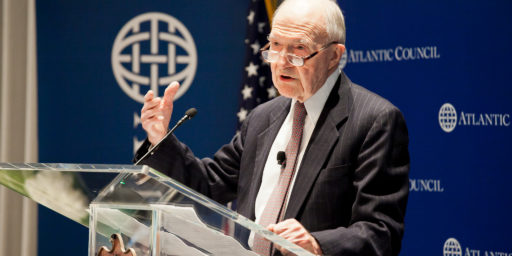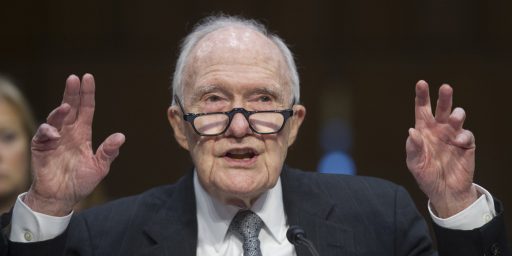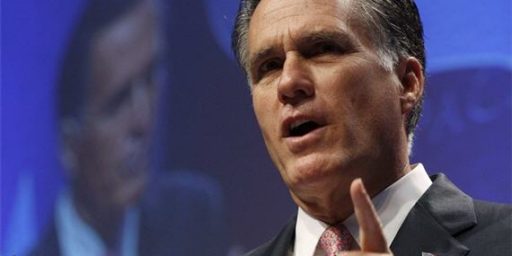Two Kinds of Realism
Matthew Yglesias revisits a familiar topic: the conflict between neo-conservatism and neo-realism.
Bush in his speech tonight once again recommitted himself to the neoconservative view of foreign policy that promoting democratic change in the Middle East through a policy of confrontation with anti-American autocracies (Syria and Iran, at this point) is the best way to secure long-term peace.
Neocons share the view that democracy is the answer with the Wilsonian idealists. The difference is that the former is more pro-active, especially with regard to the utility of military power in accomplishing regime change.
In the American political context, this view tends to get contrasted with one labeled “realism” and associated loosely with Brent Scowcroft. This view, which I’ll call “Scowcroft-realism,” emphasizes the overwhelming importance of stability to American national security largely because instability risks bringing Islamist governments to power.
True enough, although Scowcroft hardly invented the theory. Indeed, while I think him a reasonable and competent foreign policy practitioner, I’ve never thought of him as a political theorist.
I’ve been noticing through my reading lately that Scowcroft-realism seems to have little relationship with the sort of theoretical neorealist position one sees in academia. The core relevant contention of the neorealist analysis of international relations is that regime type is irrelevant to international relations.
Well, not really. The neorealists contend that state power is the key variable in international relations and that any regime will act in a way to promote its interests, with the sustaining and increasing of national power as the key interest. Neorealists don’t contend that fascist regimes and democracies or Christian regimes and Muslim ones will calculate their interests in precisely the same way, though.
This is, indeed, in tension with the neoconservative view, which espouses a form of democratic peace theory. But it’s equally in tension with Scowcroft-realism, since neorealism would seem to hold that even if Islamists come to power in Egypt (or Pakistan or Iraq or wherever) this will make no difference to American security.
Democratic peace theory doesn’t conflict with neorealism. Most “peace studies” scholars, while politically liberal, would consider themselves neorealists. Indeed, that democracies don’t fight wars with other democracies is almost universally accepted among international relations scholars.
Scowcroft is a bright guy; I can’t imagine that he believes it makes no difference if Egypt went Islamist. No one from Jimmy Carter to Al Haig would dispute that it would be bad for the interests of the United States if that happened. The policy dispute is only about what to do about it.






A lot of writers have promoting this idea of ‘realism”, while I doubt the purity of it’s lable and those who go by it, I have also recently concluded, ( and I might sound mad ) that in the next year or two some intellegence agency will uncover a highly sophisticated terrorist cell, the kicker is that they will be NON-ARABIC, and perhaps the most technologicaly equiped we have yet to come across.
Realism is a product of the cold war, and it worked well agains the Soviet threat. I’m not sure what applicability it has to the current world. As for that sophisticated non-Arab terrorist group, try the IRA for starters….
“try the IRA for starters”
I meant a group a non-arabic group disguised as an arabic group, this is a little harder to explain then it seemed at the time I posted my two cents, I’m not going to elaborate, may some other day
Yeah….uh, no.
The structure of foreign policy Realism dates back about 400 years to Richelieu, Prime Minister of France. He championed Raison D’etat at a time when foreign policy still largely consisted of Church affiliations and empires. More recently, Matternich, Bismarck and others have refined and championed Realism in foreign policy.
Realism didn’t come about during the Cold War by a very long stretch.
However, “neorealism” as an offshoot of realism is a product of the Cold War.
Neorealism, a combination of political science focused on measurable variables and the old realist school espoused by Hans Morgenthau and dating back to Richelieu, is often credited to Kenneth Waltz. The idea of “neorealism” is that nations focus on “power” (variously defined by international relations theorists), and shape their policies accordingly.
“All else being equal” (a notorious caveat), nations with more power will cause other states to oppose them. Of course, in reality, all else is never equal—but it served to “explain” the Cold War, by suggesting that the US and the USSR were both simply responding to each other’s level of power.
Perhaps, but that sounds an awful lot like the entire premise for the European balance of power for a few hundred years. Bismarck, in particular, excelled at playing nations against each other by shaping his policies to ensure that powers thwarted other powers, to the eventual benefit of Germany.
He called it Realpolitik, but all old things are Neo again. 🙂